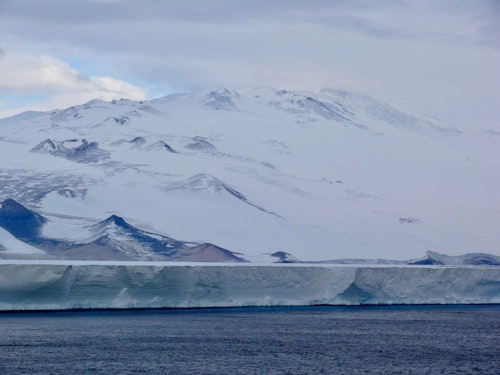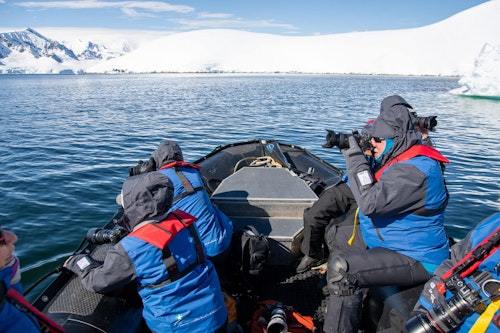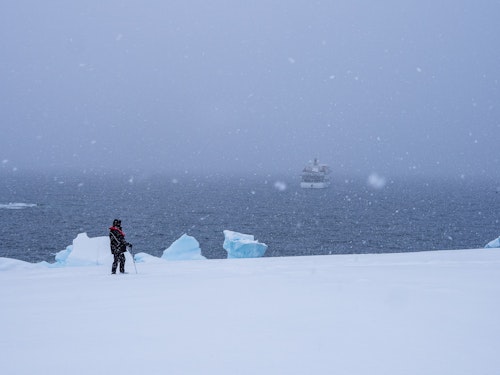From scaling the world’s highest peaks to pioneering voyages to the icy ends of the Earth, Greg Mortimer has always been guided by curiosity and courage. As the founder of Aurora Expeditions, his vision was born from a deep love of wild places and a belief in their power to transform those who experience them.
With the launch of our newest ship, Douglas Mawson, marking Aurora’s long-awaited return to East Antarctica for the first time in 13 years, we sat down with Greg to reflect on the early days, the challenges and triumphs along the way, and the enduring philosophy that continues to shape our spirit of exploration today.

What moment or experience first sparked the idea of starting Aurora Expeditions?
I remember the moments like they were yesterday. It was 1991 and I had my first taste of travelling to the Antarctic Peninsula as the expedition leader on the little Russian ship Professor Molchanov.
I just LOVED it, and I came home drunk on the cocktail of the overwhelming beauty of the place and the impact it had on even the most jaundiced of city folk amongst our passengers. I saw that this was a powerful tool to opening the minds and hearts of people to the value of nature as well being a fantastic way of earning a living.
At that time, there wasn’t an Australian company fully chartering ships to go there. Margaret and I thought “well we can have a go at that” and we started Aurora.
What were the biggest challenges when you set out — and what kept you going?
The two biggies were a serious lack of money and lack of experience. We were blithely innocent and ignorant about ship charter, the travel industry and running a business. Everything really. Naivety was our strongest trait and we took ridiculous financial risks. But we had two aces up our sleeves. One was a knowledge of extreme environments including Antarctica and the second was Margaret’s ability and enthusiasm in talking people into parting with their hard-earned dollars to travel to the ends of the world with a new Aussie start-up.
Belief in the inherent value of travelling to Antarctica kept us going.
What have the remote parts of the world taught you about people?
When you are living in a tent or snow cave at high altitude you can sometimes despise the way your buddies put their socks on in the morning or brush their teeth. But you learn to recognise that the crazy emotions are caused by the thin air or the tough conditions.
A mini version of this can happen on a voyage to a remote place so we have learnt to watch out for the signs.
What I have seen over the years is that, in the heart of most people or group of people is an almost primal desire to feel contact with raw nature. That contact brings out a deep-seated, almost child-like joy and sense of understanding about how the world works. Isn’t that wondrous!

How has exploration changed you, personally or philosophically?
I have been drawn to wild adventures since the age of 12 so I tend to view the world through the prism of big natural forces rather than the events of humans. Coming face to face with a raging storm in the mountains or 30 metres waves at sea teaches you great humility.
When you come down from living above 8,000 metres, many of the things we think are important in normal day to day life don’t seem so important anymore. I hold on to that filter of what’s important and what’s not. It has become my guiding light.
What behaviours or values do you think make an 'Aurora person'?
Aurora people are the best sort of people. They are open-minded, light-hearted, curious, adventurous in spirit in various shapes and forms and willing to step outside the box a little to learn about themselves and the world and go over the far horizon.
Looking at how far Aurora has come, which moments make you proudest?
Margaret and I sold Aurora over 15 years ago now so we can’t take the credit.
But what the heck, I am really proud of how Aurora has continued to grow but kept true to the original philosophy of treating each passenger as an individual, allowing freedom of movement in wild and potentially dangerous places and deepened its commitment to the path of making the world a better place through its actions and education efforts.
With that we have opened the eyes and minds of tens of thousands of impressive people.

What does legacy mean to you in the context of Aurora?
Ooh that’s a tricky one because I look forward, not back. But I will die happy if Aurora has realised its full potential to be an agent of change by influencing the behaviour of its passengers to lessen their climate impact in their day to day lives.
What worries you most and what gives you the most hope about polar and remote tourism?
I worry that polar and remote tourism becomes too big for its boots and loves the regions to death. At the moment the industry hasn’t got to the point of causing environmental damage. We do have some management issues in some places where too many ships in the one area at the same time do impact on the wilderness values.
However, this industry is populated very largely by people who are driven by a love of the places not the love of money so that is cause for hope.
Join an expedition and be part of the story
More than three decades since its founding, Aurora Expeditions continues to embody Greg Mortimer’s legacy of adventure, humility, and respect for the natural world. As the Douglas Mawson sets sail on her inaugural voyages, a new chapter of discovery begins — one that invites explorers to follow in Greg’s footsteps and experience the power of the wild for themselves.























